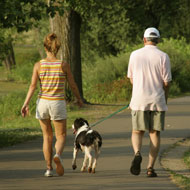
Barking council in bid to catch 'selfish' owners
A UK local authority has revealed plans to DNA test dog poo in order to catch 'selfish' owners who do not clean up after their pet.
It may sound like a late April Fool's joke, but Barking and Dagenham Council are the first local authority in the country to introduce such a scheme. They have teamed up with the DNA sequencing company, PooPrints UK.
DNA is collected from dogs by a cheek swab and stored in a registry, at a cost of £15-£30 to the owner, the company says. If the owner then fails to pick up after their pet, a DNA test can trace the registered dog with 99.9 per cent accuracy. The owner could then face fines of up to £80.
It is expected that a pilot scheme will be introduced and, if successful, it will be rolled out across the borough from September 2016.
The move was announced at a dog fouling forum in Barking this week, where attendees discussed how to encourage owners to register their dog's DNA and how to tie this in with the upcoming requirement for all dogs to be microchipped.
Opening the forum, councillor Darren Rodwell said: "We are the first Council in the country to get really tough on dog mess and pet owners who do not act in a socially responsible way. The vast majority of dog owners in Barking and Dagenham are socially responsible but unfortunately a selfish few think it’s ok to not clean up after their pet."
Dog poo DNA testing is undertaken in 45 US states, as well as Canada. The program is also currently being trialled in Israel and Singapore.
Biotech company Streetkleen is overseeing PooPrints in the UK. Its managing director Gary Downie claims the scheme has reduced dog fouling by as much as 90 per cent in parts of the US.
The Kennel Club's Caroline Kisko, however, has reservations about making the scheme compulsory, and the cost to dog owners.
She told the Evening Telegraph: "…it would be difficult to make this compulsory and enforceable which would likely mean that only responsible owners, who already pick up after their dogs, would register - the irresponsible minority who do not pick up after their dogs would simply continue to flout the law...
"We would also be concerned if there was a cost involved for dog owners, which could effectively become a tax on responsible owners."



 The veterinary mental health charity Vetlife is inviting the veterinary community to join it for a sponsored cold-water dip.
The veterinary mental health charity Vetlife is inviting the veterinary community to join it for a sponsored cold-water dip.